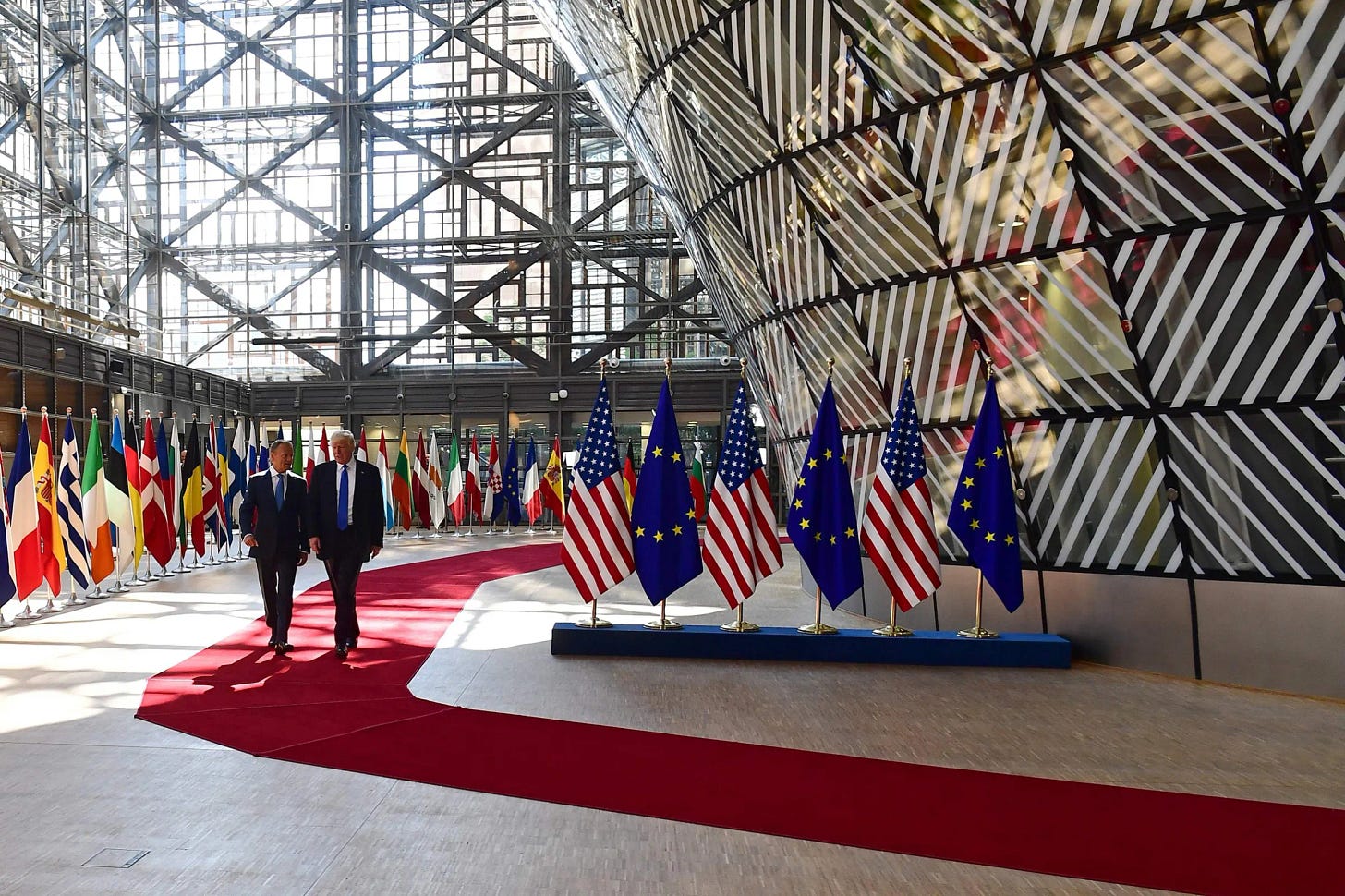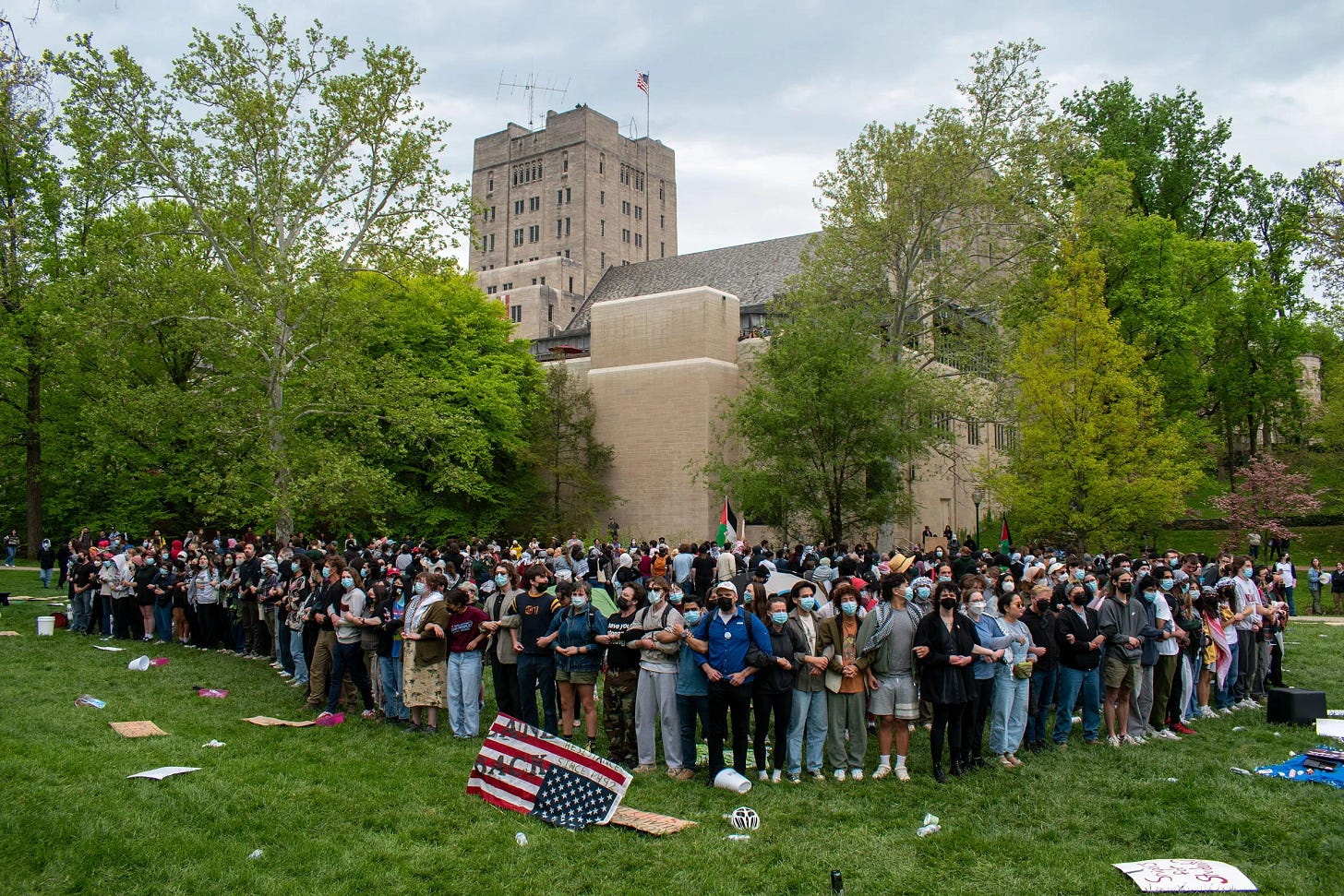Hello, and happy Friday!
With Thanksgiving having just gone by, I’ve decided to start this correspondence with an ode to some of the things that I’ve been particularly grateful for these days—a list that is neither exhaustive or in any particular order:
The Palestinian rapper Saint Levant’s Deira tour. I went to the London show last week and it was by far one of the most glorious celebrations of Palestinian culture and heritage that I’ve ever experienced. If you haven’t yet listened to his music, I recommend starting here and here.
A Day in the Life of Abed Salama, the Pulitzer Prize-winning book by Nathan Thrall, is quite possibly my favorite read of 2024.
The New York Times’s Connections game, which I got turned on to after reading this great Q&A that my friend and former Atlantic colleague Elaine Godfrey did with the game’s editor. (“Imagine a jigsaw puzzle made of riddles. Think crossword, but evil.”)
The “Wicked” musical, which I somehow managed to avoid all knowledge of until taking in a show last weekend here in London (thank you, Steve). I’ll be listening to “For Good” for the foreseeable.
All of you, for continuing to be a part of this very one-sided correspondence.
In podcast news: I joined Tortoise’s The News Meeting podcast to discuss the week’s top stories (my pitch was about the lightning advance on Aleppo by Syrian rebels) and the Quiet Riot podcast, in which Alex Andreou and I discuss the fallout of the U.S. presidential election. Tune in at the links above, or wherever you get your podcasts.
What I’ve written
As the world prepares itself for season two of the Trump presidency, I caught up with my sources in Europe about how the continent is thinking about the year ahead:
European leaders see Donald Trump’s return to the White House as a spur to the continent’s independence amid the potential weakening of a partnership that has shaped the world for most of the last century. “We can’t depend on U.S. voters every four years for our security,” Benjamin Haddad, France’s Minister Delegate for European Affairs, tells TIME. “Trump will defend U.S. interests—it’s normal. It’s now time to wake up and defend ours.”
That sentiment, expressed in recent years by French President Emmanuel Macron and others, has gained a growing resonance in the weeks since Trump’s victory over Vice President Kamala Harris, who had vowed to maintain the historical relationship embraced by President Joe Biden and every other post-war U.S. President save for Trump. In European capitals, observers say the shock many Europeans experienced after the 2016 election has given way to a more muted stoicism in 2024. Trump’s trademark unpredictability notwithstanding, Europeans are more clear-eyed about what they can expect from a second Trump term—in part because he’s already made his intentions clear. In wide-ranging interviews with TIME earlier this year, Trump pledged to take Europe to task on issues such as trade (“European Union is brutal to us on trade”) and defense spending (“I want Europe to pay”). He also vowed to end the nearly three years of fighting between Russia and Ukraine in as little as a day—an aim that some fear could involve forcing Kyiv to cede territories that Moscow has claimed as its own.
Keep reading: With Trump on Deck, Europe Reaches For Its Checkbook
I also wrote about a new report tracking the health of civic freedoms around the world, out this week, which identified a notable trend: Crackdowns on Palestinian solidarity protests in every kind of society, from the most open to the least.
Most protests are over issues close to home—food prices, national politics. The throngs that gathered outside South Korea’s parliament on Tuesday were chanting against the President’s abrupt imposition of martial law, which outlawed just such expressions. Had the decree survived the day, the space for civil society in South Korea might have dropped from its current assessment, “narrowed,” to “obstructed” in the next annual CIVICUS report, titled People Power Under Attack. The group assays civic space in 198 countries, from “open” to “repressed,” and in its newly released report found that nearly one-tenth of the protests suppressed by authorities involved Israel’s war against Hamas in Gaza, or solidarity with the Palestinian people.
Keep reading: New Report Details How Pro-Palestinian Protests Are Suppressed in Democratic Countries
What I’ve read
This cover story on the influence of Citizen Musk:
Not since the age of William Randolph Hearst, the newspaper magnate who greased FDR’s ascent nearly a century ago, has a private citizen loomed so large over so many facets of American life at once, pulling the nation’s culture, its media, its economy, and now its politics into the force field of his will. Standing beside him, even Trump can seem almost in awe, less of a boss than a companion to the man for whom this planet and its challenges are not big enough.
For now they act like partners, bonded through the favors they are trading and their shared desire to disrupt the institutions of government. They may deliver commands with one voice for a while. But their agendas do not align on everything. Both are willful, impulsive, and accustomed to being in charge. What will happen if they start to clash?
This essential profile of Trump’s nominee to be the next FBI director
It wasn’t a question of ideology. He wasn’t a zealot like Stephen Miller, trying to make the bureaucracy yield to his agenda. Rather, Patel appeared singularly focused on pleasing Trump. Even in an administration full of loyalists, Patel was exceptional in his devotion.
This was what seemed to disturb many of his colleagues the most: Patel was dangerous, several of them told me, not because of a certain plan he would be poised to carry out if given control of the CIA or FBI, but because he appeared to have no plan at all—his priorities today always subject to a mercurial president’s wishes tomorrow. (Patel disputes this characterization.)
What wouldn’t a person like that do, if asked?
This persuasive (and perhaps quixotic) argument for how Biden could still save the Middle East—and his legacy
Less than two years ago, Biden’s legacy was being compared with that of one of the greatest American presidents, Franklin Roosevelt. Today, no one is making such comparisons, and many Democrats and progressives have denounced Biden’s conduct on the Israeli-Palestinian conflict. A far-sighted move could provide a better ending to the foreign policy chapter of his story, as a president who rallied a global coalition to defend freedom, democracy, and human rights not just for Ukrainians but for Palestinians, as well.
What I’m thinking about
How 2024 is nearly over! You can expect one more correspondence from me before the end of the year, in which I’ll be sharing a bit of personal news. Stay tuned 👀
Until next time,
Yasmeen





